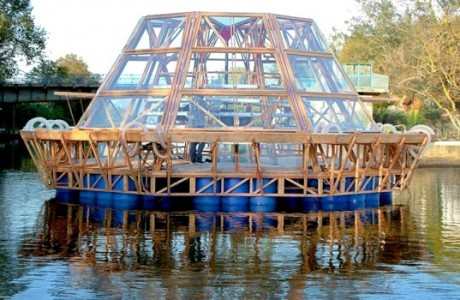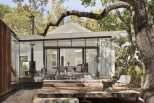A private redevelopment project that wanted to unite contemporary functionality and charm of unspoiled nature. An existing pre cottage…

Jellyfish Barge is a floating agricultural greenhouse that produces food without consuming ground, fresh water and energy. Jellyfish Barge was designed especially for those communities vulnerable to the shortage of water and food.
The greenhouse frame is built with simple technologies, recycled materials and low cost.
Jellyfish Barge is a multidisciplinary project coordinated by professor Stefano Mancuso of the University of Florence, director of the International Laboratory of Plant Neurobiology and designed by architects Antonio Girardi and Cristiana Favretto.
Jellyfish Barge is a modular greenhouse built on a floating platform which ensures water and food security by ensuring the supply of food and water without weighing on existing resources. It is a floating agricultural greenhouse able to purify salt and brackish or polluted water by using solar energy.
The property consists of a 70mq2 large wooden stand floating on barrels/stems made of recycled plastic, a glass greenhouse that is supported from a wooden frame, and a glass dome which covers everything for the cultivation of crops.
Inside the greenhouse a special type of hydroponic high efficiency cultivation is used. It can save water up to 70% compared to traditional hydroponic systems. Water is supplied from solar desalination Unit 7 placed along the perimeter of the greenhouse and that are capable of producing up to 150 liters of fresh and clean water every day. Solar distillation is a natural phenomenon: in the seas, solar energy evaporates water, which falls as rain water then. Solar desalination system mounted on Jellyfish Barge reproduces this natural phenomenon on a smaller scale and it is modular, that means individual elements are totally autonomous while various barges side by side create a stronger body.
The energy that runs JellyFish Barge is supplied from solar panels, wind turbines and a system that takes advantage of the waves to generate electricity.
Jellyfish Barge was designed to support about two families. For this reason its dimensions are contained: that makes its construction simple and feasible, even in conditions of economic hardship. Tiling multiple greenhouses can ensure food security for an entire community.
It will be produced by Pnat srl. Pnat is the first Italian “think tank” where design, science and biology can meet to the study creative and technological solutions to the issues left open by the sustainability: in a planet with limited resources, how can we ensure food security, access to water and resilience of communities to environmental changes?
You can see this wonderful example of eco-friendly greenhouse at the World Expo in Milan.
#ecofriendly #JellyFishBarge




